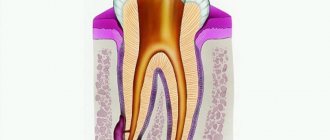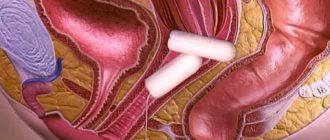Basic moments
Many people know how uncomfortable toothache can be. Sometimes it can be so strong that it is simply impossible to tolerate it. For this reason, it is necessary to take emergency measures to alleviate the condition.
Dental problems can appear at any time, even during menstruation in girls and women. This period is special for the body, so the treatment may differ slightly.
But first, it’s worth considering the main points in the table below.
| Nuances | Peculiarities |
| Recommendations for installing a seal | If the enamel is slightly damaged, a simple operation can be performed. The dentist can perform it within 45 minutes. During the period of tooth restoration, the patient begins to instinctively tense up. As a result, compression of smooth muscles is observed, which is accompanied by severe pain. It is recommended to take a pain reliever before undergoing this procedure. It is advisable to notify your doctor about this. Critical days do not affect the procedure; usually in these situations the woman’s condition is taken into account. |
| Postponement | If severe pain occurs and persistent processes of destruction of tooth enamel and roots begin, then it is better to visit a dentist. In these situations, a delay may have a negative impact on your health. But for the period of menstruation, the doctor may give a short delay. To prevent the tooth from causing severe pain, it is professionally cleaned and medicine is placed in it. |
| During the procedure | If you decide to have your tooth treated during your period, be sure to measure your blood pressure before going to the dentist. It is worth paying attention to the fact that during menstruation there is a decrease in blood pressure and pain threshold. During treatment, these factors may affect your well-being. Sometimes even loss of consciousness may occur. Pain may also increase during the procedure. It is advisable to discuss anesthesia with your doctor, namely the medicine that will be used for pain relief. |
| After the procedure | If during your period the doctor prescribes tooth extraction surgery, then it is important to follow all the necessary recommendations. After removal, healing of the wound begins within 15 minutes. During menstruation, the process of cell regeneration may be slightly slower. If the cavity does not heal for a long time, it is better to consult a doctor. After a clot has formed, the wound should not be touched with the tongue, otherwise it can be injured, which will lead to increased bleeding. During menstruation, increased bleeding can negatively affect the condition - nausea, dizziness, and weakness may appear. |
| Complications | During menstruation, a woman’s body is weakened, and the immune system drops. This means that during major surgical interventions there remains a risk of complications. When removed, an infection may enter the wound, which can further provoke an inflammatory process and separation of pus. In these cases, you should immediately consult a doctor. |
Tooth extraction during menstruation
The decision to remove a tooth during menstruation is made jointly by the patient and the dentist. Usually the doctor relies on:
- Diagnosis
- Disease severity
- General condition of the patient and her well-being
- What manipulations need to be done
If a woman feels well, but the toothache is persistent, most likely the dentist will decide on surgical intervention. In this case, the doctor must observe safety measures: select the correct dose of pain medication, administer a drug that improves blood clotting, and carefully monitor the patient’s well-being.
After tooth extraction, you need to monitor the patient’s condition, measure her blood pressure and, if all is well, give the necessary recommendations and send her home.
https://youtu.be/7BnWZiJcQjg
General recommendations
Before you begin treatment, tooth extraction and other manipulations, you should pay attention to important recommendations. Compliance with them will avoid serious consequences and complications.
General recommendations include:
- It is not recommended to drink a lot of liquid before the procedure. Also, don't overeat your food. Sometimes nausea and other symptoms of digestive disorders occur during the procedure;
- all medications that are intended for systemic administration should be used only as prescribed by a doctor;
- If you are taking any medications, you should tell your doctor about it. The fact is that some drugs are incompatible with agents used for anesthesia;
- Do not drink alcohol, alcohol causes vasodilation. It is also worth giving up smoking;
- During the consultation, it is necessary to tell whether there is an allergy to medications, manifestations of edema and intolerance;
- Do not take hot baths, showers or other procedures involving steam. When treating or removing a tooth, this can all lead to increased bleeding.
Read the causes of arthritis of the maxillofacial joint.
How much does zenerite cost in a pharmacy? More details here.
Folk remedies for pain relief
In cases where a visit to the dentist and serious treatment have to be postponed for a while, you can take any available pharmaceutical painkillers. It is only important to carefully study the instructions and note whether you have any contraindications. Some folk remedies also help well:
- Soda and salt solutions - just add a teaspoon of soda or salt to a glass of boiled and slightly cooled water, stir well and rinse every two hours. This remedy perfectly relieves pain and soothes the mucous membranes.
- Decoctions of some medicinal herbs work in the same way. To do this, pour a glass of boiling water into a tablespoon of any dry herb - chamomile, St. John's wort, sage, calendula. Let the broth boil and leave for a while until it becomes warm. After straining the product, use it as a mouth rinse.
- Essential oils of clove or fir - just drop a little on a cotton swab and apply to the affected area. It relieves pain and improves general condition.
- Calamus root decoction - pour a tablespoon of raw material into a glass of boiling water and boil in a water bath for several minutes. After the product has infused, it is filtered and used as a rinse.
You should not overuse such recipes. This is just a temporary measure to relieve pain and mild inflammation of the soft tissues until you can go to the doctor for full treatment or tooth extraction.
Video: the color of your period can tell you about this.
Home Recipes
If you experience tooth pain during your period, you should immediately contact your dentist. It is the doctor who will conduct a thorough diagnosis, clean the tooth and put medicine into it that can reduce pain. If necessary, he can postpone treatment during menstruation.
If you can’t visit a dentist, you can reduce pain at home with simple recipes and remedies:
- To disinfect a diseased tooth, as well as relieve the inflammatory process, you can use mumiyo. The folk medicine should be applied to the sore tooth every hour and a half;
- The mouth can be rinsed with a decoction of chamomile leaves and flowers. 1 tablespoon of the mixture is poured into a glass and 200 ml of hot water is poured. Infuse for 30 minutes;
- To eliminate pain and inflammation, you can use infusions of various medicinal herbs - St. John's wort, valerian, eucalyptus, sage. They are prepared simply - pour 1 tablespoon of any herb into a glass and pour in 200 ml of boiling water. It is recommended to leave for about 30 minutes. Then it is filtered and the mouth is rinsed with warm infusion;
- For severe pain, a decoction of calamus root helps. 1 tablespoon of dry plant roots is poured into a medium bowl, 200 ml of hot water is poured in and placed in a water bath. It is recommended to simmer the mixture over low heat for 30 minutes. Next, the broth is filtered and cooled. The prepared solution can be used as a rinse;
- Camphor oil helps to eliminate discomfort. A small amount of the product is applied to a cotton swab and applied to the diseased tooth.
Is it contraindicated during menstruation...
Nevertheless, there are often situations when a tooth crumbles, or gums bleed, suppuration appears, gumboil and other problems arise precisely on critical days. So what should a woman do in each specific case and why can’t she perform individual manipulations?
- Filling – doctors do not note any special contraindications for this procedure. But there are some recommendations. If a woman has increased sensitivity or a strong fear of the dental chair and related instruments, it is better to reschedule the treatment for another day.
- X-ray examination also does not lead to prohibitions. After all, the effect of rays on the body is absolutely painless and short-term. Therefore, it is possible to conduct a preliminary diagnosis using X-rays and determine the area and severity of tooth damage during menstruation.
- Prosthetics already has more nuances, since in this case there are various difficulties in carrying out manipulations. So, if you need to install implants, then the risk of their rejection by the female body is high. But adjustments, preparation, polishing and other simple procedures can be carried out even during this period.
- Removing teeth during menstruation is also not recommended, because it requires surgery, and any operations during a woman’s critical days are prohibited. And all because of the above-mentioned features of her body. If you tear or remove a tooth during menstruation, this poses a risk of loss of consciousness, heavy bleeding, tissue infection and poor wound healing.
- Professional cleaning is one of the few procedures available during this difficult period. It is performed without tissue damage or any pain, so it does not cause any risks.
As you can see, it is possible to treat teeth during menstruation, but with many reservations. The main thing is that when you go to the dentist at this time, you warn him about your special condition. If a woman took any painkillers before treatment, she should also inform the doctor about them.
Is it possible to treat teeth during menstruation?
Is it possible to treat teeth during menstruation? This question arises for many women, because toothache and other unpleasant symptoms can occur at absolutely any time.
Dental procedures have different features, so some of them can be used during menstruation, but others should be avoided.
So, let's consider some features of dental procedures and their possibility of use during menstruation:
- filling. This procedure can be safely performed during menstruation. Treatment of caries can be carried out calmly, especially if there is not severe damage to bone tissue;
- prosthetics. It is usually carried out in several stages. During menstruation, it is not recommended to install pins. During this period, the body experiences a hormonal imbalance and increased production of prostaglandins, which can lead to foreign body rejection. For this reason, this particular procedure should be postponed for several days, but other activities can be carried out as usual;
- tooth extraction. During menstruation, any surgical procedures, including removal, should not be performed. This is because increased bleeding may occur during this period. It is better to postpone this manipulation for a couple of days;
- professional cleaning. Menstruation is not a contraindication for this procedure. During it, there is no damage to soft tissues, and everything goes away without pain.
What procedures can be done during menstruation?
If a woman has her period, this does not mean that she should not go to the dentist. Of course, it is advisable to wait 1-2 days, when the discharge will be less intense, your health will be more stable, and the blood clotting process will normalize. But there are a number of dental procedures that can be performed regardless of the day of your cycle. These include the following manipulations:
- dental filling. If there is superficial caries or its 2nd degree, requiring only light cleaning of the damaged area, then filling the tooth during menstruation is allowed. This procedure is usually done without a painkiller injection and does not require subsequent antibiotics. Even if there is an infection, it does not spread widely enough to affect healthy tissue. No drainage or multi-stage therapy is required; treatment is performed in 1 visit. Menstruation does not affect the process of bonding between the filling and the tooth. The bone tissue will not be more fragile at this time and will not resist the placement of light-curing or any other material;
- dental prosthetics. This is a multi-stage procedure, so it does not matter what material is used. During one visit, the teeth are ground down, then an impression is made, fittings are carried out, and ultimately the structure is brought to the desired size. All these manipulations are not prohibited during menstruation. You can even install a prosthesis, with the exception of screwing in the pin for the implant;
- take an x-ray of your teeth. The manipulation is immediate and absolutely painless. The film is placed under the area of the gum that the doctor is interested in, and it is in this direction that the radiation goes. The rest of the body is protected in the form of plates that do not allow X-rays to pass through; for women, the pelvic organs and breasts are especially protected. The radiation will not affect the intensity of menstrual flow in any way;
- You can have your teeth cleaned at the dentist. Professional cleansing is mainly done with ultrasonic waves or a water-salt solution, so when your period arrives, there is no need to cancel the pre-arranged procedure. It lasts no more than 40 minutes and will not affect a woman’s cycle in any way;
- saturation of tooth enamel with missing minerals (remineralization). The procedure takes place in several stages and is carried out to increase the strength of tooth enamel and get rid of superficial caries. If you do not carry out 1 or more planned procedures, the infection may remain in the tooth, then all previous remineralization sessions will be useless. If your health during menstruation allows you to go to the dentist for this procedure, then you should not postpone the visit;
- It is possible to remove teeth during menstruation, but we will talk about the conditions for performing this procedure in a separate section.
If you come to see the dentist during your period, you should definitely warn the doctor about this, especially if it is necessary to remove one of the teeth. This is necessary to assess possible risks associated with the healing of the hole, the effect of pain medication, possible infection, etc.
If your teeth get sick just before the onset of menstruation, then you should not panic and immediately tear them out or fill them, because this may be one of the manifestations of premenstrual syndrome, when swollen tissue puts pressure on the nerve endings in the jaw area. In this case, you can get rid of toothache by stabilizing hormone levels with medicinal decoctions or taking painkillers.
Risks
Before treatment and other manipulations, the dentist must ask the woman whether she is currently menstruating. The fact is that with this condition some problems may appear.
Possible risks include:
- during menstruation there is a decrease in the immune system, this increases the risk of developing infectious processes and suppuration;
- During this period, a decrease in blood clotting occurs; this is a completely normal physiological state. This may lead to increased bleeding when soft tissue is removed or cut;
- Some women experience changes in sensitivity and susceptibility. This may cause increased pain during dental treatment;
- During this period, hormonal changes occur, which can lead to rejection of foreign materials. This means that the installed filling can fall out quite quickly.
What are the risks?
If we talk about dental treatment during menstruation, then we need to take into account possible complications that may arise. When carrying out any dental procedures, it is very important to warn the doctor about your condition so that he can adequately assess the situation. So:
- If it is necessary to pull out a tooth or make an incision in the gum, this risks the introduction and development of infectious diseases.
- Due to changes in blood clotting, increased bleeding is possible and difficulties arise in stopping this process.
- With increased sensitivity, a woman feels more pain from any medical manipulation, which will require the use of anesthesia.
- At the same time, the effect of painkillers decreases.
- As for more serious interventions, when it is necessary to install a metal pin or other foreign structures, the female body can reject any material during menstruation due to hormonal imbalances. And then the fillings not only fall out, but even change their shade.
Therefore, doctors insist that if there are no urgent and acute conditions that need to be eliminated immediately, it is better to postpone a visit to the dental office during menstruation. It is especially not recommended to perform any manipulations in the first days of menstruation.
Safety regulations
To minimize possible risks, you should follow important safety rules:
- Before the procedure, stop drinking alcoholic beverages and smoking;
- if there is no need, then you should not take painkillers on your own;
- if there is severe pain and you took analgesics to reduce it, then you should inform your doctor about this;
- after the procedures, you should avoid overheating and hypothermia, because this can cause increased bleeding;
- Do not engage in physical activity or sports exercises;
- do not visit the sauna, baths, do not take a hot bath or shower;
- follow all doctor's recommendations regarding care;
- do not touch the hole with your tongue.
Safety first
Whatever your condition, you need to be attentive to your body and adequately assess possible risks. In order to protect yourself as much as possible, follow these rules before going to the dentist:
- Try to stop smoking and drinking alcohol, as they will only make the situation worse.
- Do not take any painkillers without consulting your doctor or tell him or her about the medications you are taking.
- Reduce the amount of food and fluid you eat before dental procedures.
- After tooth extraction or other serious interventions, avoid hypothermia or overheating.
- Refrain from increased physical activity and sports activities for 1-2 days.
- During this period, it is better not to visit the bathhouse, sauna or take a bath. It is enough to limit yourself to a warm shower.
- Listen carefully to your doctor's recommendations for oral care after the procedure and adhere to them.
- If a tooth has been extracted, then you need to save the blood clot that has formed in the socket. Do not touch it with your finger, tongue, brush or pick it out with a toothpick.
For complete safety, after major surgical interventions, stay in the clinic for some time, and only after making sure you are feeling well, go home. If there are any signs of complications or bleeding, consult your doctor.
How to remove at home
To relieve tooth pain at home, you can use the following folk remedies:
- The mouth can be rinsed with a solution of baking soda. Add 1 teaspoon of baking soda to a glass of warm water and stir until completely dissolved. You need to rinse the aching tooth every two hours until the pain subsides;
- pain and inflammation are eliminated by decoctions of medicinal herbs - chamomile, sage, St. John's wort, calendula;
- You can apply a cotton swab to the sore tooth, which is moistened with the essential oil of fir and cloves;
- Shilajit and propolis relieve pain.
Dental treatment during menstruation is not prohibited. The main thing to remember is the possible risks that may arise during or after the procedure.
See causes and treatment of red spots on the tongue in adults. What to do if the gum has moved away from the tooth? The answer is in the link.
How to treat a mouth ulcer in a child? Find out further.
The fact is that during this period the woman’s body is weakened, it is more susceptible to the influence of pathogenic factors. If possible, it is better to delay treatment for a while, and to reduce pain during menstruation, you should use home remedies.
Treatment and removal of teeth during menstruation
As you know, the female body works according to its own biological clock. As a result, many girls are interested in the question of whether it is possible to treat their teeth during menstruation and whether it is possible to remove problem teeth during menstruation. Before we begin to consider these issues, it is necessary to understand what menstruation actually is.
Menstrual cycle: quick reference
The menstrual cycle is the process of maturation of the dominant egg. This egg either must be fertilized, or it dies, resulting in menstruation. Along with the egg, the endometrium of the uterus is also subject to evacuation, again, provided that a fertilized zygote is not attached to it. During intrauterine development, a huge number of eggs are laid in the female reproductive system; as they grow and mature, their number decreases and in the puberty period no more than 600-700 remain. Some of them will subsequently undergo maturation, and some will undergo degeneration.
So, is it possible to start dental treatment during menstruation? The answer to this question will be strictly individual. In addition to local changes in the female reproductive system that occur during menstruation, the general condition of the body and the ratio of hormones in it also change. The female body is subjected to severe stress during menstruation. This is caused by a shift in the ratio of sex hormones, primarily estrogen and progesterone. This, in turn, has an effect on the nervous system (there is a predominance of sympathetic innervation over parasympathetic and, as a result, increased excitability, nervousness, increased blood pressure) and the brain, which completely adapt to the “critical” situation. In addition, the woman’s body is also weakened by blood loss. After all, the intensity of bleeding is individual for each woman. Along with menstrual blood, a woman also loses formed elements: platelets, leukocytes, lymphocytes. Each of the groups of these cells performs its own functions: platelets are responsible for coagulation, leukocytes are responsible for antimicrobial activity. That is, the body is less capable of stopping bleeding after, for example, tooth extraction, and is less resistant to suppuration. As a result, complications such as bleeding after tooth extraction are often observed during menstruation. suppuration of the postoperative wound, longer wound healing.
Why visit the dentist?
A natural process such as menstruation can disrupt the traditional routine of a number of dental procedures. Features of treatment during menstruation are determined by changes in the female body.
This is what happens to the patient these days:
- blood clotting is reduced: a measure necessary for the uterus to completely clear itself of stagnant clots that can subsequently cause inflammatory processes;
- general weakness, decreased pain threshold, vulnerability to infections;
- inadequate response of the body to medications;
- According to unofficial observations of dentists, changes in hormonal levels affect the structure of dental tissue, which is why the guarantee of successful filling is insignificant, but still decreases.
Due to impaired blood clotting, it makes sense to postpone surgical operations for several days, provided that we are not talking about suppuration and other critical situations requiring immediate medical intervention.
Read also: Fissure caries treatment
During non-surgical treatment, microtraumas of the gums and mucous membranes occur, or the procedure itself requires incisions. Poor blood clotting can be an unpleasant surprise for both the patient and the doctor. It is for this reason that it is important that the dentist knows in advance about the woman’s condition and prepares blood clotting agents in advance.
The menstrual day is not the only thing you should inform your dentist about. Diabetes mellitus affects the quality of blood clotting. To avoid unforeseen situations, it is necessary to warn about the presence of cardiovascular diseases and allergic reactions.
Critical days often accompany a woman with heightened sensitivity to many external factors. Toothache is no exception. The question arises: how to quickly relieve toothache at home? There are many activities that will help cope with this problem.
Read about the various methods of using and wearing braces during pregnancy at this link.
Read about the unpleasant odor of acetone in the mouth here.
Possible complications
During menstruation, a woman's body is weakened. Against the background of a weakened immune system, the risk of developing inflammation increases if an infection gets into the socket. Swelling of the cheek and gum tissues persists for 2-3 days. If purulent discharge appears, you should not delay visiting the doctor again.
The increased risk of complications during menstruation is due to the following reasons:
- changes in hormonal levels may affect the effectiveness of anesthesia;
- anticoagulants produced by the body, which prevent menstrual blood from clotting, also affect the slowdown in the formation of a protective clot in the socket after tooth extraction;
- reduced immunity cannot cope with pathogenic bacteria in the mouth, which increases the risk of developing an inflammatory process.
Do you feel nervous before visiting the dentist?
Not really
The formation of a blood clot is significantly delayed compared to the usual 15-20 minutes due to reduced clotting. Blood loss can cause nausea, dizziness, and weakness. In some cases, tooth extraction ends in the loss of consciousness of especially sensitive patients due to the combination of all negative factors: pain, emotional stress, blood loss and menstruation. Don't rush home after surgery. Only after making sure that the bleeding from the wound has stopped and you are feeling good can you leave the medical facility.
Strictly follow the rules of oral hygiene. An open wound in the mouth, combined with reduced immunity, often becomes inflamed when bacteria enter it and can fester. Repeated surgical cleaning of the socket and additional treatment will be required.










